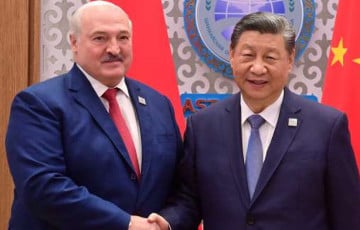Lukashenko Made A Gaffe In A Statement About Xi Jinping
10- 19.07.2025, 19:13
- 16,184

Did a dictator prophesize the death of the head of the People's Republic of China?
June 7, at the opening of the National Football Stadium, Alexander Lukashenko suggested putting a monument to Si Jinping in Minsk.
"I said at the entrance (near the stadium there is a sculpture depicting soccer players of Belarus and China - note): it would be good to put a monument to my friend Xi Jinping here. Because it is only thanks to him that the Chinese built this stadium at their own expense," said the Belarusian leader.
UDF explains why Lukashenko made a serious blunder in flattering the Chinese leader.
Are there any monuments to Xi Jinping in the world?
Si Jinping has been leading China for the third term, but despite the obvious increase in China's global influence during this time no official monuments to him have been erected either in China or anywhere in the world.
In open sources, one can find information that before Lukashenko, a "stray idea" was expressed in Serbia. In 2021, the new communist party there came up with such an idea. Its argumentation was the need to thank China for billions of dollars of investments and millions of doses of vaccines against coronavirus.
But no one supported this idea. There were no words of approval, including from Beijing.
By the way, in China itself there are not only no monuments to Xi Jinping, but also more modest busts of him. And in general, monuments to living people are not officially unveiled in China. Why?
Chinese tradition: why it is unacceptable to erect monuments to living people
There are several reasons why it is unacceptable for the Chinese to erect a monument to Xi Jinping while he is still alive.
One of the main reasons is Chinese traditional culture and philosophy. In them, a monument is a symbol of the end of a path, a means of consolidating the legacy of a person or a deity. Therefore, Lukashenko's idea to erect a monument to a living person may be perceived by the Chinese as a bad sign.
An equally important reason is the historical experience of the personality cult of Mao Zedong. The praise of the "great helmsman" had terrible consequences for the country; after his death, China feared the personality cult like fire.
The personality cult was condemned under Deng Xiaoping, considering it dangerous for the stability and development of the country. And since then, China has officially avoided excessive glorification of living politicians, including a ban on erecting monuments.
When local authorities in Henan province got the idea to erect a 36-meter-tall golden statue of Mao Zedong in 2016, it stood for only three days and then was destroyed.
And when a little earlier in Guizhou province they installed a small monument with the inscription "Comrade Hu Jintao stood here" (at that time the current head of the PRC), it provoked a wave of ridicule and mockery. Hu Jintao himself was clearly not happy about this.
The erection of monuments to living people does not fit in with the ideological principles of the Chinese Communist Party with its emphasis on collectivism. Although, of course, the cult of personality of Xi Jinping is present in modern China, but it has a more subtle character, excluding, among other things, the ubiquitous presence of his portraits in public space.
So, Lukashenko's idea to erect a monument to Xi Jinping in Belarus cannot be positively perceived either by ordinary Chinese or by the Chinese leadership. If the Chinese leader learned about the initiative of his "friend," he would probably curse him with the last words.











